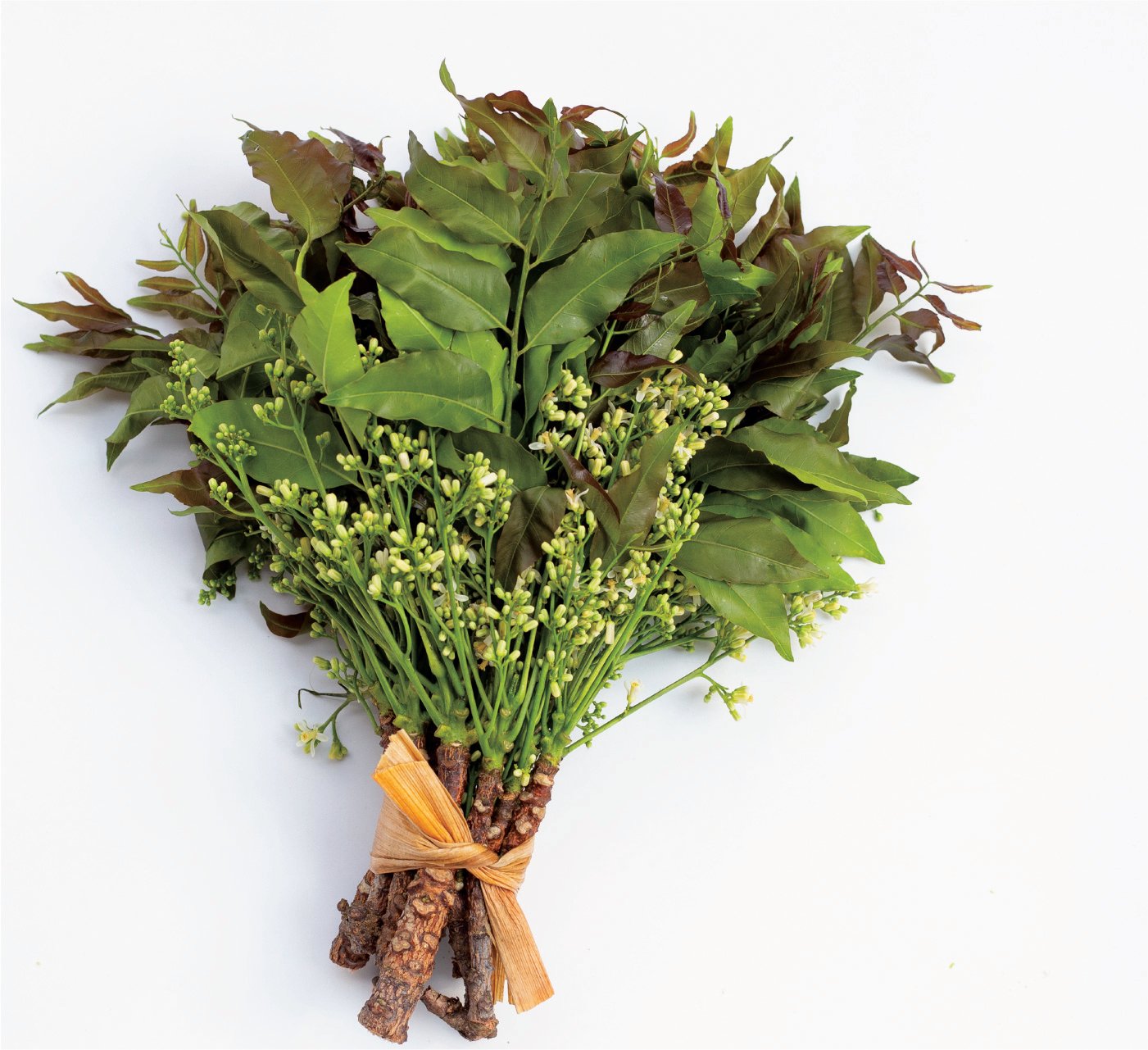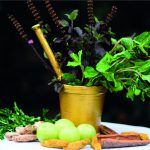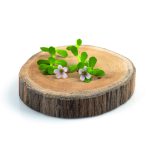We’ve heard Yoga is beneficial to our physical and mental wellbeing. There are very well…
Read MoreA hardy plant native to the Indian subcontinent, neem is widely hailed for its therapeutic medicinal properties. For centuries now, traditional ayurvedic medicine has used this versatile plant to treat body aches, fever, and infections and even give your teeth a good rub. The benefits of neem juice are numerous, and it can treat almost any ailment from your head to your toes.
Having a neem plant around you is like staying next to a live pharmacy.[1]on Neem, Panel, and National Research Council. “Neem: A Tree For Solving Global Problems.” (1992). You are most likely to find a neem tree growing in most villages, if not individual households across India. Nothing of the plant goes to waste – everything, from its leaves, flowers, seeds, fruits, roots, and even its bark, is used in various traditional formulations.

Making neem juice doesn’t take much effort or time. Whichever of the two options you select, make sure to wash the neem leaves in water to remove dirt or any other impurities.
1. Fresh leaves
Soak 10-15 neem leaves in water for 5 mins. Discard the water and then blend it together with some water in a juicer/blender. Avoid storing it and drink it fresh.
2. Dry leaves
Here’s a simple way to store and also a quicker way to consume neem juice. Sun-dry a big bunch of neem leaves for 3 days in a shaded area. Grind them dry into a fine powder. Store this in a dry, airtight container. Dissolve 1 tbsp of this powder in a glass of water to enjoy fresh neem juice.
Neem seeds contain an active compound that fights off parasites that harm your hair and skin. For instance, neem juice can ward off lice and even dandruff by inhibiting the parasite’s reproduction process. The anti-inflammatory and antimicrobial properties of neem can help it fight off dandruff and get rid of scalp irritation. Even though neem has potent compounds, it is still safe for consumption by kids.
Villagers in rural India chew on neem sticks and then use them as a toothbrush.[2]Almas, K. “The antimicrobial effects of extracts of Azadirachta indica (Neem) and Salvadora persica (Arak) chewing sticks.” Indian journal of dental research: official publication of … Continue reading Neem bark is one of the main ingredients in organic toothpaste. An antiseptic, anti-inflammatory, and antioxidant – neem has immune-boosting properties and promotes overall oral health. It can also help cure tooth decay. While it is not possible for everyone to access neem barks, packaged herbal juices can save the day, especially in urban areas.
Many studies have shown that neem minimizes the bacteria’s ability to colonise and reproduce on your teeth’ surface, thus reducing plaque formation.[3]Lakshmi, T., Vidya Krishnan, R. Rajendran, and N. Madhusudhanan. “Azadirachta indica: A herbal panacea in dentistry–An update.” Pharmacognosy reviews 9, no. 17 (2015): 41.
Neem’s antioxidant and anti-inflammatory properties can help your body fight off oxidative stress, leading to problems in your liver and your kidney.[4]Kaur, Gurpreet, M. Sarwar Alam, and M. Athar. “Nimbidin suppresses functions of macrophages and neutrophils: relevance to its antiinflammatory mechanisms.” Phytotherapy Research: An … Continue reading A buildup of free radicals can cause oxidative stress. Although free radicals are a byproduct of metabolism, external factors can hamper their production, further leading to tissue damage in your liver and kidneys.[5]Deavall, Damian G., Elizabeth A. Martin, Judith M. Horner, and Ruth Roberts. “Drug-induced oxidative stress and toxicity.” Journal of toxicology 2012 (2012).
Studies have shown that neem juice can be beneficial when fighting liver damage.
Neem is rich in fatty acids, thus having anti-inflammatory, antioxidant, and antimicrobial properties that promote healthy skin. Neem has also been used to treat psoriasis and eczema in the past.
Many women swear by neem to treat their skin issues like acne and blemishes and improve the elasticity of their skin.
It is no secret that neem is a wonderous plant with umpteen medical benefits. Similar to keeping other diseases at bay, neem also helps fight diabetes and control blood sugar levels by reviving cells that produce insulin.[6]Bhat, Menakshi, Sandeepkumar K. Kothiwale, Amruta R. Tirmale, Shobha Y. Bhargava, and Bimba N. Joshi. “Antidiabetic properties of Azardiracta indica and Bougainvillea spectabilis: in vivo … Continue reading
Animal studies have shown that the application or consumption of neem can increase the inflammatory response in our body and form new blood vessels speedily.
Another significant thing about neem is that it is a powerful detoxifying agent. It starts working on your cells as soon as it enters your system and thoroughly cleanses your blood. It improves your blood circulation and facilitates the removal of toxins from your blood, and gives you a healthier system inside and out.
It is also essential to talk about the effects of neem on our doshas.
Neem is a herb with all three types of taste – bitter, astringent, and light. It has a dry quality and cold potency with a pungent metabolic taste and pacifies Pitta and Kapha doshas. At the same time, it can have the opposite effect on Vata doshas. Neem has a positive impact on many body tissues, including rasa, rakta, mamsa, asthi, and shukra.
Milk is amongst the best sources of calcium for healthy bones and a rich source of protein for restoring your body’s core strength and muscles. Neem also contains an adequate amount of calcium and minerals that help you build stronger bones and reduce inflammation. Regularly consuming neem juice can help relieve the symptoms of arthritic pain in your joints. Neem oil works magically in relieving muscle aches and joint pains and even helps ease the discomfort associated with osteoarthritis and lower back pain.
The coronavirus epidemic has highlighted the deadly impact of viruses on human populations. Neem works as an excellent antiviral agent and inhibits the production of any virus, thus minimising the chances of catching an infection. Numerous studies have researched the potential benefits of neem in fighting viruses as harmful as polio, HIV, and even dengue when detected in its earliest stages. It is essential to know that in no way does the consumption of neem guarantee the total eradication of the disease.
It is advisable to consume neem leaves or neem juice on an empty stomach. Not only does it help reduce inflammation in your gastrointestinal tract, but neem is also beneficial for reducing ulcers, and other issues like constipation, bloating, and other similar problems. It helps prevent infections, manages blood sugar levels and keep skin problems at bay.
Although neem is bitter, neem is a healing wonder. There are multiple benefits of drinking neem juice on an empty stomach every morning. The essential bio-active ingredients in neem and its therapeutic properties make it a household favourite. It helps fight digestive issues, regulates blood sugar and diabetes, treats ulcers and wounds, prevents oral problems, enhances skin qualities, diminishes hair woes, etc.
Check this video to learn about the amazing benefits of neem juice:
Yes. The recommended dosage is about 2-3 tablespoons of neem juice in warm water every morning on an empty stomach. You can make the juice by steeping 4-5 neem leaves in hot water or buy off-the-shelf organic neem juice. You can add a dash of honey and lime to make this more palatable. Please check the dosage instructions on the product labels or check with your medical practitioner to decide the ideal dosage suited for you.
Consuming neem juice helps fight hair issues like dandruff and scalp irritation, lower blood sugar levels, remove and prevent oral plaque formation, improve liver and skin health, strengthen bones, and ward off viral infections.
Ideally, 2-3 tablespoons of neem juice, or 4-5 neem leaves (steeped in hot water), or 60 mg of neem churna is considered safe and beneficial. The concentrations of juice and churna might vary based on the brand you choose, so please refer to the dosage guidelines on the product label or consult your doctor/ayurvedic practitioner.
Neem is a wonder herb for overall health. It’s rich in fatty acids and has anti-inflammatory, antioxidant, and antimicrobial properties that treat skin issues like acne, blemishes, psoriasis, and eczema.
The best time to drink neem juice is to do so early in the morning, ideally on an empty stomach. If doing so hampers your daily schedule, you can also consume it before meals, once or twice a day, to support weight loss and control diabetes.
Neem is generally safe for consumption for all ages. Consult your physician if you are on diabetic medications as neem will lower blood sugar levels. Avoid oral intake of neem oil or concentrated neem juice. If you have hypersensitive skin, add a carrier oil like coconut oil with diluted neem oil before applying it to your skin. Avoid neem products for pregnant women, recuperating patients, and infants.
References
| ↑1 | on Neem, Panel, and National Research Council. “Neem: A Tree For Solving Global Problems.” (1992). |
|---|---|
| ↑2 | Almas, K. “The antimicrobial effects of extracts of Azadirachta indica (Neem) and Salvadora persica (Arak) chewing sticks.” Indian journal of dental research: official publication of Indian Society for Dental Research 10, no. 1 (1999): 23-26. |
| ↑3 | Lakshmi, T., Vidya Krishnan, R. Rajendran, and N. Madhusudhanan. “Azadirachta indica: A herbal panacea in dentistry–An update.” Pharmacognosy reviews 9, no. 17 (2015): 41. |
| ↑4 | Kaur, Gurpreet, M. Sarwar Alam, and M. Athar. “Nimbidin suppresses functions of macrophages and neutrophils: relevance to its antiinflammatory mechanisms.” Phytotherapy Research: An International Journal Devoted to Pharmacological and Toxicological Evaluation of Natural Product Derivatives 18, no. 5 (2004): 419-424. |
| ↑5 | Deavall, Damian G., Elizabeth A. Martin, Judith M. Horner, and Ruth Roberts. “Drug-induced oxidative stress and toxicity.” Journal of toxicology 2012 (2012). |
| ↑6 | Bhat, Menakshi, Sandeepkumar K. Kothiwale, Amruta R. Tirmale, Shobha Y. Bhargava, and Bimba N. Joshi. “Antidiabetic properties of Azardiracta indica and Bougainvillea spectabilis: in vivo studies in murine diabetes model.” Evidence-Based Complementary and Alternative Medicine 2011 (2011). |


We are a team of food scientists and Ayurveda experts at Kapiva. Our mission is to raise awareness and educate people on ancient principles and herbs found in traditional texts. We work together to develop the most comprehensive content on Ayurveda which is grounded in peer-reviewed, scientific research.

We’ve heard Yoga is beneficial to our physical and mental wellbeing. There are very well…
Read More
Ancient wisdom dictates that one must eat breakfast like a king, lunch like a prince,…
Read More
Ayurveda is a form of alternative medicine that has been around for centuries but is…
Read More
Brahmi is a bitter-sweet medicinal herb that has been prominent across several cultures. It is…
Read More